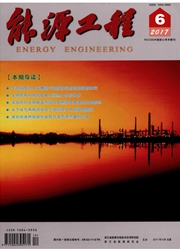

 中文摘要:
中文摘要:
在分析各种生物质能利用技术的基础上,建立了基于层次分析法的集总加权评价模型,确定了技术适用性、经济可行性、环境友好性三个评价准则,及资源供给、装备技术、能源利用率、能源品位、生产成本、经济收益、生态影响、环境污染、社会收益等九个评价指标,并对模型进行了实例计算和验证,评价结果对指导未来生物质能开发利用具有重要的参考价值。
 英文摘要:
英文摘要:
Based on the summarization of the different utilization technologies of biomass energy, the law-weighted total evaluation model according to the Analytic Hierarchy Process(AHP) was set up, and three evaluation criteria (the applicability of technology, economic viability and environment-friendly) and nine indicators, including supply of resources, equipment and technology, energy efficiency, energy grade, production cost, economic benefits, ecological impact, environmental pollution and social benefits, were brought out. Meanwhile, the model was validated with variant cases. The conclusion can be used to provide an important reference for guiding future development.
 同期刊论文项目
同期刊论文项目
 同项目期刊论文
同项目期刊论文
 Emission characteristics of heavy metals and organic pollutants from the combustion of sewage sludge
Emission characteristics of heavy metals and organic pollutants from the combustion of sewage sludge Pyrolysis characteristics and kinetics of sewage sludge by thermogravimetry Fourier transform infrar
Pyrolysis characteristics and kinetics of sewage sludge by thermogravimetry Fourier transform infrar Combustion Modeling of Blended Coal in a 300MW Tangentially-firing Boiler with a Three-mixture-fract
Combustion Modeling of Blended Coal in a 300MW Tangentially-firing Boiler with a Three-mixture-fract An Improved Petrov-Galerkin Spectral Collocation Solution for Linear Stability of Circular Jet, CMES
An Improved Petrov-Galerkin Spectral Collocation Solution for Linear Stability of Circular Jet, CMES A Special Issue on 2009 Sino-Australian Symposium on Advanced Coal and Biomass Utilisation Technolog
A Special Issue on 2009 Sino-Australian Symposium on Advanced Coal and Biomass Utilisation Technolog An economic feasibility study of O2/CO2 recycle combustion technology based on existing coal-fired p
An economic feasibility study of O2/CO2 recycle combustion technology based on existing coal-fired p Relationship between nitrogenous species in coals and volatile nitrogen-containing yields during pyr
Relationship between nitrogenous species in coals and volatile nitrogen-containing yields during pyr An investigation of the causes of the difference in coal particle ignition temperature between combu
An investigation of the causes of the difference in coal particle ignition temperature between combu Effect of cellulose, lignin, alkali and alkaline earth metallic species on biomass pyrolysis and gas
Effect of cellulose, lignin, alkali and alkaline earth metallic species on biomass pyrolysis and gas Physical quantity synergy in the field of turbulent heat transfer and its analysis for heat transfer
Physical quantity synergy in the field of turbulent heat transfer and its analysis for heat transfer The effects of coal blending on the formation and properties of particulate matter during combustion
The effects of coal blending on the formation and properties of particulate matter during combustion The Solution of Transient Riadative Transfer with Collimated Incident Serial Pulse in a Plane-Parall
The Solution of Transient Riadative Transfer with Collimated Incident Serial Pulse in a Plane-Parall Optimization of combustion based on introducing radiant energy signal in pulverized coal-fired boile
Optimization of combustion based on introducing radiant energy signal in pulverized coal-fired boile A compact optimization strategy for combustion in a 125 MW tangentially anthracite-fired boiler by a
A compact optimization strategy for combustion in a 125 MW tangentially anthracite-fired boiler by a Volatilization behavior of Cd and Zn based on continuous emission measurement of flue gas from labor
Volatilization behavior of Cd and Zn based on continuous emission measurement of flue gas from labor Numerical simulations of the slagging characteristics in a down-fired, pulverized-coal boiler furnac
Numerical simulations of the slagging characteristics in a down-fired, pulverized-coal boiler furnac A pilot scale study on co-capture of SO2 and NOx in O-2/CO2 recycled coal combustion and techno-econ
A pilot scale study on co-capture of SO2 and NOx in O-2/CO2 recycled coal combustion and techno-econ Pyrolysis of maize stalk on the characterization of chars formed under different devolatilization co
Pyrolysis of maize stalk on the characterization of chars formed under different devolatilization co Effects of Indigenous and Added Minerals on Transformation of Organic and Inorganic Sulfur in Densit
Effects of Indigenous and Added Minerals on Transformation of Organic and Inorganic Sulfur in Densit Mineralogy and chemical composition of high calcium fly ashes and density fractions from a coal-fire
Mineralogy and chemical composition of high calcium fly ashes and density fractions from a coal-fire Study of flow mechanism and heat transfer enhancement in longitudinal-flow tube bundle of shell-and-
Study of flow mechanism and heat transfer enhancement in longitudinal-flow tube bundle of shell-and- The Formation and Emission of Particulate Matter during the Combustion of Density Separated Coal Fra
The Formation and Emission of Particulate Matter during the Combustion of Density Separated Coal Fra An efficient solution for linear stability of circular jet: A combination of Petrov-Galerkin spectra
An efficient solution for linear stability of circular jet: A combination of Petrov-Galerkin spectra Physical quantity synergy in laminar flow field of convective heat transfer and analysis of heat tra
Physical quantity synergy in laminar flow field of convective heat transfer and analysis of heat tra 期刊信息
期刊信息
